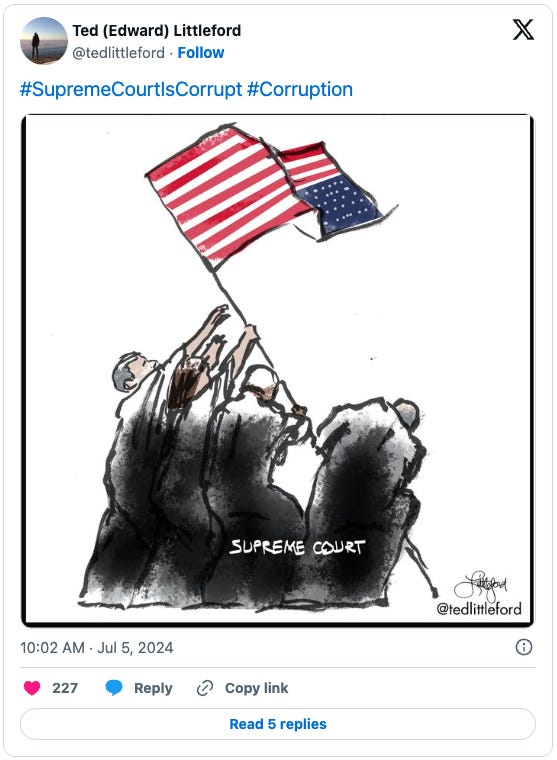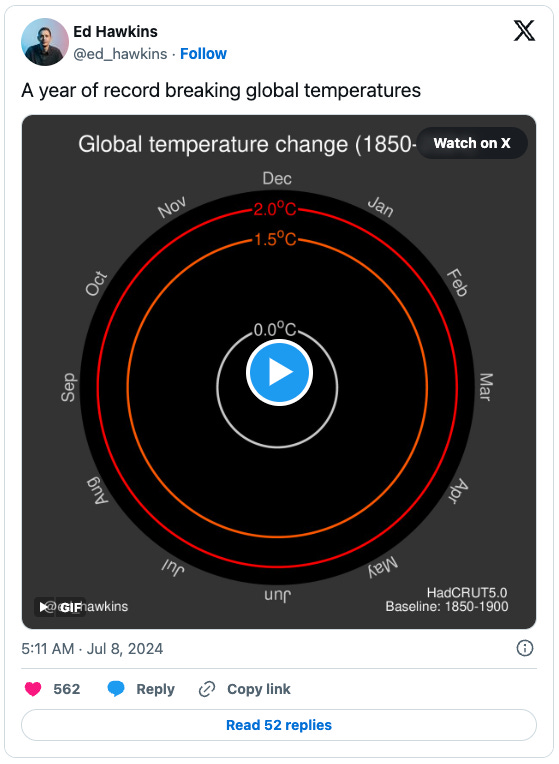What An Utterly Surreal Week In American Politics
INSIDE: Donald Trump ... Mike Luttig ... Joe Biden

A lot of things happened. Here are some of the things. This is TPM’s Morning Memo.
A Seismic Jolt
One week ago today the Supreme Court issued its landmark decision in U.S. v. Trump, creating a monarchial presidency the likes of which the founders would have taken up arms against.
The court’s response to an attempted auto-coup by a defeated president who is poised to potentially regain office in a matter of weeks was to carve out vast new areas of presidential immunity and invent new rules of evidence that no one was even arguing about yet – but to do so with no clear standards or bright lines, reserving to itself the considerable power to set them later or not set them at all and decide things as it sees fit on a case-by-case basis where it can craft its own preferred outcomes.
And yet … the biggest national political story since then has not been the Supreme Court’s unilateral rebalancing of the Constitution’s separation of powers in favor of Donald Trump’s short-term criminal defense and long-term political power, but rather Joe Biden’s decline with age and his fitness to defeat Trump in the November election. Historians will struggle to make sense of this week because it’s impossibly surreal for those of us living through it.
Politics – and covering politics – is hard even in normal times because there is so much uncertainty, so few anchors or touchstones, and compromise is built in, which can blur lines and make things seem adrift. The kind of feeding frenzy were witnessing now is often driven by an unusual level of seeming certainty. The sense that something is suddenly clear and obvious and undeniable – like Biden’s debate failure – can act like a magnet for those exhausted by all of the nibbling at the margins, hedging bets, and the never-ending difficult task of balancing interests that is required in a mature political economy. Moreover, the supposed obviousness of the immediate issue can often override consideration of the downstream consequences. Sometimes, the decision that looks so obvious in the moment gets a whole lot more opaque when you start to grapple with the knock-on effects.
In contrast to Biden’s nationally televised failure, the Supreme Court’s decision on presidential immunity was complex, in writing, and with impacts that while real remain in many ways contingent and forward-looking. In the media economy, it’s obvious which story is easier to tackle. Likewise, the entire march toward authoritarian rule remains murkier and harder to cover than the up-and-downs of a political campaign.
But I want to stay focused on the Supreme Court decision because I think this past week was a fulcrum in U.S. political history.
The Supreme Court Is Now The Kingmaker
I mentioned last week that while on the surface U.S. v. Trump seems like a dramatic expansion of executive power the reality is that at its core it aggrandizes power to the high court itself. We’ll keep returning to this theme, but in the meantime:
I want to direct you to this piece by Asha Rangappa:
[T]here are so many implications written between the lines that fundamentally alter the balance of power among the branches, not only making the President effectively a king, but making the Court’s conservative majority the kingmakers who rubber stamp or veto what kinds of actions get immunity (thereby ensuring that any potential dictator is symbiotically dependent on the Court to preserve his facade of legitimacy).
A brief but insightful thread from NBC News’ Lisa Rubin.
SCOTUS ‘Cut The Heart And Soul Out Of America’
Former Appeals Court Judge J. Michael Luttig continues to be singular voice of our time, a conservative Republican of the old school horrified by his party’s abandonment of the rule of law as on organizing principle for democracy:
Intellectually Honest Conservatives Get It
Richard Bernstein, a former clerk for Antonin Scalia who is cut from the same cloth as Judge Luttig, finds in U.S. v. Trump many of the same hallmarks that conservatives loathed in Roe v. Wade. That’s a provocative point of view for a progressive audience, but he’s exhibiting an intellectual consistency that the Supreme Court’s right-wing justices have abandoned.
SCOTUS Decision Already Impacting The MAL Case
A series of developments in the Mar-a-Lago case since the decision in U.S. v. Trump are a taste of the ways in which the Supreme Court has hobbled the Trump prosecutions:
Trump is seeking to delay the Mar-a-Lago case in light of U.S. v. Trump.
In response, U.S. District Judge Aileen Cannon has for now delayed the next batch of deadlines in the case and provided a very generous briefing schedule to consider the impact of U.S. v. Trump on the charges against the former president.
Trump is seizing on Justice Clarence Thomas’ concurrence in U.S. v. Trump to renew his claim that Special Counsel Jack Smith was unlawfully appointed.
Cannon rejected Trump co-defendant Walt Nauta’s motion to dismiss for selective and vindictive prosecution but was careful to note that it should not be interpreted as her taking a position on Trump’s still-pending similar motion. She also took a swipe, as per usual, at prosecutors in the final footnote of the ruling.
How to Stop Fascism
Yale historian Timothy Snyder recounts in some detail the five lessons we learned from the rise of Nazism in 1930s Germany:
Voting matters
Coalitions are necessary
Conservatives should be conservative
Big business should support democracy
Citizens should not obey in advance
Well Put
Good Decisions Aren’t Made In The Midst Of A Feeding Frenzy
I don’t have much to add to the maelstrom of Biden coverage and whether he will stay or go, or whether that’s a good idea or a bad idea, or who is best positioned to defeat Trump. But I’ll refer you to Brian Beutler’s thoughtful weighing of the most important considerations.
‘Some Folks Need Killing’
Following up on some of the ground-breaking reporting that TPM’s Hunter Walker has done on the GOP nominee for governor in North Carolina, Greg Sargent highlights a June 30 Mark Robinson speech in which he said:
Some folks need killing! It’s time for somebody to say it. It’s not a matter of vengeance. It’s not a matter of being mean or spiteful. It’s a matter of necessity!
Greg has all of the context, and it’s not good.
The Big Picture

Houston/Galveston narrowly dodged a climate-fueled bullet this morning as the necessary ingredients came together a few hours too late for Hurricane Beryl to re-intensify into a monster storm.
For the casual observer, it’s worth noting that Beryl was doing climatologically crazy stuff last week in the tropical Atlantic and Caribbean. With record-high sea surface temperatures creating conditions not typically found until the August/September peak of the hurricane season, Beryl was able to do things in terms of intensity and location at a time of the year that simply would not have been physically (as in, physics) possible before.
Weather is not climate, but Beryl was such an outlier and our understanding of the physics of tropical cyclones advanced enough that the connection is clearer and more concrete than can sometimes be drawn with other weather phenomena.
Related:
Want better media? Support a better media company!
TPM is reader-funded, unionized, and mission-driven. Read our mission.





Expand the court. 13 justices, vigorous ethics code that is enforceable, 10 year terms w/ rotation in/out of Appeals courts. Need to win the election to do this.
Thank you for focusing on the court. That, Project 2025 and Trump past, present and future is what everyone needs to focus on. Not one man’s age.